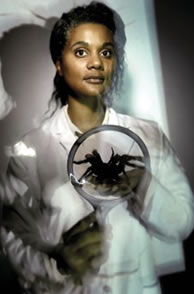UTSC zoology professor Maydianne Andrade (MSc 1995) remembers the first time she witnessed the brutal mating ritual of Australian redback spiders, a close relative of the black widow. It was 12 years ago and Andrade, a graduate student, had been at the lab all night watching the spiders’ extended courtship. Then the main event happened: the male deliberately positioned himself over his lover’s fangs – while still copulating – and was soon consumed. “I ran around the department in a sort of eureka moment,” she says. Andrade and her research colleagues had heard about the bizarre cannibalistic act, but she was the first in her lab to witness it.
This fall, Popular Science magazine named Andrade, 36, one of its “Brilliant 10” young scientists in North America. In 1996, her pioneering work on redback spiders’ mating habits was published in the prestigious journal Science. While other scientists had proposed that the males sacrificed themselves to literally feed their future offspring, Andrade proved that their suicidal behaviour is in fact an act of self-interest, allowing them to copulate for longer and fertilize more eggs. Male redbacks greatly outnumber females and only 10 to 20 per cent live long enough to find a willing mate, so any opportunity to spread their genes is worth dying for.
One of Andrade’s most recent discoveries is that male redbacks actually break off their copulatory organs in females to prevent other suitors from usurping their paternity. “This is about the power and elegance of natural selection to create these amazing behavioural strategies that you would just never predict,” she says.
Andrade currently has between 1,500 and 2,000 redbacks in her University of Toronto at Scarborough lab, along with a few pet tarantulas. In an adjoining workspace, her husband, Professor Andrew Mason, studies hearing systems in the parasitic fly and acoustic signalling in insects such as crickets and spiders. Not surprisingly, their three-year-old daughter “likes creepy-crawlies,” although spiders were an acquired taste for Andrade. “I wasn’t phobic as a child,” she says, “but I wasn’t a big fan.” Today, though, she can’t imagine ever getting bored with the eight-legged creatures. “Even now, they’re always surprising me.”
Recent Posts
People Worry That AI Will Replace Workers. But It Could Make Some More Productive
These scholars say artificial intelligence could help reduce income inequality
A Sentinel for Global Health
AI is promising a better – and faster – way to monitor the world for emerging medical threats
The Age of Deception
AI is generating a disinformation arms race. The window to stop it may be closing






2 Responses to “ Dangerous Liaisons ”
Professor Andrade is to be commended for her extraordinary work on the mating habits of redback spiders.
However, it seems to me a little presumptuous to claim that the dying male knowingly and deliberately breaks his copulatory organ in order to prevent other males from copulating with the same female. Is the dying insect really concerned about a future lover? Perhaps the rigid organ simply snaps in the death agony of the hapless male.
We then have the remarkable statement that all this is the result of natural selection. Freely confessing my ignorance and naiveté, could someone tell me how natural selection would create this dance of death?
Paul W. Roberts
MD 1947
Markham, Ontario
Prof. Andrade responds: "Deliberately" is shorthand, and is not meant to imply cognition. In redback spiders, the male sex organ has a defined breaking point and fits directly into the female's genitalia in a way that prevents sperm of subsequent males from entering. Even males that manage to survive the copulation (those that are not cannibalized) leave this structure behind in the female. Accurate placement of the "plug" results in close to 100 per cent paternity. I suggest Richard Dawkins' classic The Selfish Gene for an accessible discussion of natural selection and its implications.